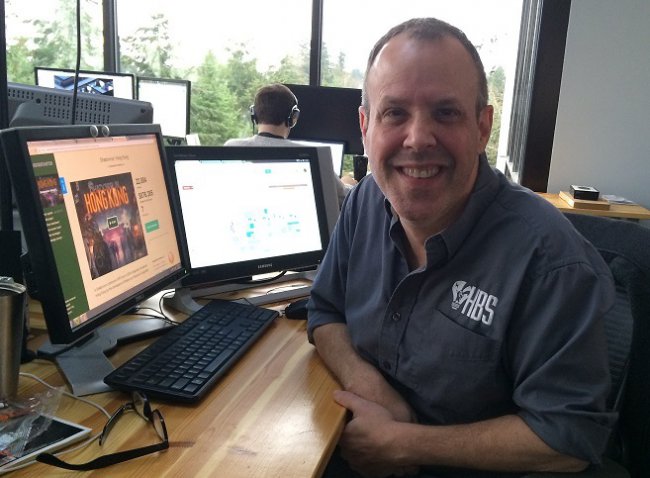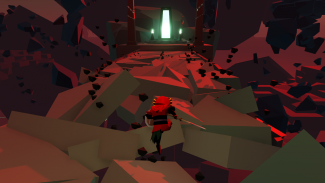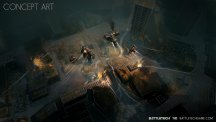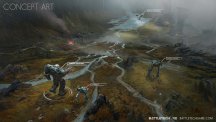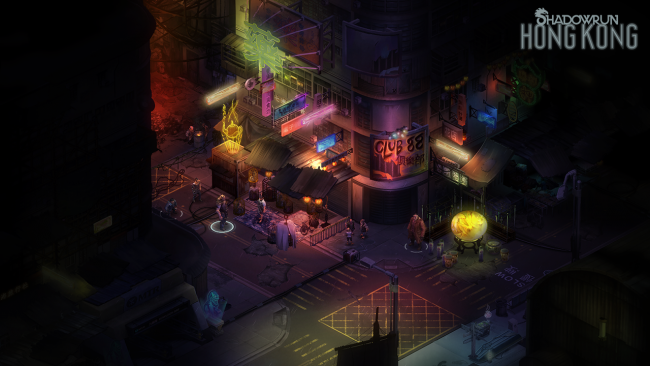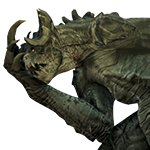Jedi Master Radek
Arcane
- Joined
- Dec 12, 2013
- Messages
- 4,236
Because other Devs have it.
http://www.gamereactor.eu/articles/...emes+From+Storage+Space+to+Kickstarter+Kings/
http://www.gamereactor.eu/articles/...emes+From+Storage+Space+to+Kickstarter+Kings/
Harebrained Schemes: From Storage Space to Kickstarter Kings
We had a long chat with co-founder Mitch Gitelman about the studio that brought Shadowrun back to life and that plans to do the same for BattleTech.
Harebrained Schemes were founded in 2011 by Jordan Weisman and Mitch Gitelman coming off the closure of FASA Studio, responsible for a great number of games including Crimson Skies, Shadowrun and Mech Commander, Mech Warrior and Mech Assault. Their first major project was Shadowrun Returns (2013, funded via Kickstarter) and this game spawned sequels in the shape of Shadowrun: Dragonfall (2014) and Shadowrun: Hong Kong (2015) both with their own separate Kickstarter campaigns. Currently they are working to fulfil the last bit of content for Shadowrun: Hong Kong that was promised in the Kickstarter, and they've just started up on their latest Kickstarter project BattleTech (once again going back to an old FASA property), while the promising and action-RPG Necropolis is closing in on release.
- Text: Bengt Lemne & Brandon Green
- Published the 1st of Jan 2016 at 16
You've got so many different things going on so we thought we'd catch up and get an update on what's happening. Can you give us a brief overview of what's going on at the studio at the moment?
Mitch Gitelman: Oh my. Well let's see, we are hard at work on pre-production on Battletech after closing our kickstarter in October. So we got a pre-production team rolling there, a lot of good things are happening between now and the end of the year. A lot of documentation during prototyping, that kind of thing, and the BattleTech team is very excited.
We also have the Shadowrun team, who are doing Shadowrun: Hong Kong, they're also fulfilling a Kickstarter reward right now creating a mini-campaign that happens right after the events of Shadowrun: Hong Kong. So you can take your high level character from the end of Shadowrun: Hong Kong and import it into this new mini-campaign. I think it's going to be about a five hour campaign or so. Depending on the level of detail you play at it could be about seven hours. So that's coming out early next year. Also for Shadowrun: Hong Kong we just recorded an audio commentary to give to backers, so you'll be able to play through the game and as you enter different scenes you'll see a little icon. When you click it you'll hear the development teams' voices describe the making of that particular level, that kind of thing.
That's BattleTech and that's Shadowrun and the other big news from the studio is our big new title Necropolis is coming out early next year. Necropolis is a 3D dungeon dive, an action game, a timing based game, kind of in the Dark Souls model. We married that with procedurally generated roguelike games. In this one the idea is you go as far as you can, die, start over again. Get as far as you can, get a little further, die and along the way pick up all sorts of magic items and weapons and stuff like that to level up yourself. There's some crafting involved. The marriage of a 3D action game and a roguelike, we feel it's going to be a big addictive draw for people. That's a completely new and original title as well, that's not one of our old licenses that we brought back, so we're really excited about Necropolis too and that's coming to Steam early next year.
We remember seeing that one at PAX East...
Yeah, we won Best of Show by Destructoid.
A lot of different things to talk about. Let's start with Kickstarter. It feels like it's an integral part of who you are, the Kickstarter model and being there, connecting with fans. How would you say that sort of model impacts the way your studio is run.
It impacts us in a number of ways and your right, it has a pretty big influence on who we are and how we develop games. I think the biggest thing about Kickstarter is that it has allowed us to develop relationships with our audience and we love that. Making games, you know, more connected with the people who play them is a really big deal to us and allows us to interact on a level that previously we never had the experience of doing. I think the big thing about Kickstarter for us we are humanised game development, I think that's the best way to put it. Turns out that there are these hard working people making your games and to find out a little bit about who they are, what motivates them, how they work together, what the process is.
I think it's been a positive thing for the industry and the players. I really appreciate our fan base because they understand that we have integrity, that we deliver what we tell them we're going to deliver. That was a really big deal during the last campaign, since we had already gone through three successful campaigns. We walked into it with a level of credibility that was just kind of luxurious and we were able to interact with the audience in a positive way because of that. They were very excited about BattleTech.
So that was the number one thing, the relationships. The number two thing is that it does have a pretty big impact on how you develop that game. I won't call it positive or negative, I'll just call it an impact because when you're making a non-Kickstarter game, guess that's the way to start. What you're doing is that you create a high level vision, then they'll pre-production that, hone that vision and then you start prototype work. Then as you prove or disprove different things, you add or remove features. Until finally you come up with something that you think is worthy of shipping.
With Kickstarter it's a little different, the process feels very similar except for a couple of things. If we have committed to a feature in the Kickstarter we feel that feature is sacrosanct. If we told our backers we are doing this, we're not going to cut that feature, we're going to stay at it until we make it work. That can be a little confining but on the other hand, what you get is all those people backing your project and showing you support and that's a big thing. Because in the old days when I used to make video games, we'd come up with an idea for a game, you'd keep it very secret and then at a certain amount of time before you ship the game, you unveil it to the world and find out if people want it. That's a really hard way to make games, especially some of the games I've made that have taken over three years to make. So you're literally waiting three years to find out if all your hard work, if anybody cares at all. With Kickstarter you find out right away that they want your game or not, and it's a great proving ground from that perspective. Making a game for an audience that's cheering you on, sending you pizza and bagels to get you through the long nights or early mornings; that's a big deal for a development team. So I'd say those are the two major ways that Kickstarter has impacted us.
Would you say that you're doing Necropolis as a means to sort of do something that's perhaps neither one of those two things but perhaps somewhere in between?
No, Necropolis, I'm really proud of the process of Necropolis because, we invested in our own people. It's a completely original idea. My partner Jordan Weissman and I had nothing to do with the development of the idea. We just stuck a couple of senior people in a room for a summer and said, don't come out until you've have a prototype that you think you are proud of. So they came out with Necropolis and they presented it to us and we were just blown away.
First of all the art style, Mike McCain and Chris Rogers (our creative directors) really did a great job of setting it apart from other action games, it's just a beautiful game. That was a big deal but the idea of taking a Dark Souls-like, timing-based action game and combining it with a procedurally generated dungeon dive like Spelunky or something like that. Putting those two things together and design director, Dennis Detwiller, I just thought that was a really smart move. Nobody has done that yet, so the combination of those things really excited us and what's great for us as a studio, it's our first real-time 3D game as a studio so that's a big first. Another big first is that it's not based off one of our old licenses, one of my partner's that he's created like Shadowrun or Battletech or Crimson Skies, something like that. So it's not based on one of those, so we're really proud of that and then the other thing is, neither Jordan or I led the project. So it's a real first in a number of ways for the studio, it kind of represents a milestone for us as we mature as game developers.
Necropolis (2016)
Necropolis is planned for release next year on Steam (PC, Mac, Linux), with a console release still to be determined. Below you'll find an interview with Harebrained Schemes' Mike McCain from PAX East about the game as well as a trailer released for PAX Prime.
BattleTech. Was it always the plan to bring it back in this fashion?
Actually yeah kinda. What happened was, when I went to Jordan, god in 2012 and said, hey have you been looking at this Kickstarter thing maybe we could do something with this. It was actually November 2011 and we're like, I don't think this is the right time for it. Then Tim Schaefer came out with his and we're like damn it, we were right. When we talked about doing that, we talked about doing it for Shadowrun for Shadowrun Returns. The dream was always, wouldn't it be great if we could do this for BattleTech.
The rights to BattleTech were just kind of a mess. So we sort of stayed away from it for a while but the cool thing was, with Battletech, although we've wanted to make it forever and we knew we wanted to make it turn-based like the original board game. So we always had this simple vision for one day, wouldn't it be great to give back to BattleTech fans, the way we did with Shadowrun fans. Actually it was the Shadowrun fans that sort of enabled the BattleTech fans because, with the overwhelming support that we got from Shadowrun and the fans reaction to what we did, the great reviews. That caught Microsoft's attention back to us. Obviously we had the Shadowrun license and they were really positive about it but, once they saw what we did with it, it was actually Phil Spencer who is the vice president of Microsoft Studios who really wanted us to do a Battletech game. To his credit, he's a really great guy. He was a good boss when I worked for him and he's a fan of Jordan's. From his point of view this had nothing to do with money any more or anything like that or licensing, screw that from his perspective. He had a chance to satisfy BattleTech fans by giving us the license and so he did. He just wanted there to be a good BattleTech game because there hadn't been one in so long and, that's how that happened and I'm pleased about that to.
It's good when things can work out like that. It's not always the case.
No and it's good when a vice president at a major corporation, for no good reason other than he wants to do something good for gamers and grants us this license.
It can be the curse of the value of an IP. Even though you're not doing anything with it. It sits there as some sort of value for the company and they don't want to get rid of it, then no one gets to do anything.
Just to be clear, they haven't gotten rid of it. They just told us to make a BattleTech game.
But they wouldn't do anything with it themselves...
Exactly and he saw that as a no win situation.
But there were no strings attached, you were told to just go ahead and do it.
What kind of string were you thinking of?
Well maybe, we don't want to see it on a competing platform.
Phil's not about that. It's not about a lack of competition, he would love it if we supported the platform but not at the cost of another platform. He's not about that.
You mentioned about how the Shadowrun fans enabled BattleTech. Would you say that there's a lot of cross over between the two. I would assume that there is some crossover...
There's some but not a lot. We're hoping for much more. Now that we have credibility with Shadowrun fans, our hope is that when we make our Battletech game that they'll play the game because it's one that we made and they believe in us now. So there is a real hope there's a cross over and vice versa. When people play our Battletech game our hope is that they'll go and play our Shadowrun game and we saw that during the kickstarter, people were picking up the Shadowrun games to see what we're all about. At the very least they went to our Steam page and read all of the really positive reviews. We're really lucky. We've been treated really well on Steam-
It sounds like you went into the Kickstarter at a very early stage of the project with BattleTech and, that your still prototyping and whatnot. When did you make that decision? A lot of developers will actually have a game in proper development?
Right and the thing that they are doing when they do that, is to prove that they've got something of value. They have something to prove. Well from our point of view, we had already proven that we were credible game developers. We had made games that people had liked, made Kickstarter games that we actually delivered on. So with those two things, plus we had the guy who created Battletech, we felt like we could go without a prototype and we were right. But the reason why we did it one of the major ones is when you start a project, in order to plan it properly you want to know the complete feature set, you want to budget the complete feature set, you want to design the right feature set.
Multiplayer for example, determines a lot of how you're going to design single-player. If you're designing a single-player and multiplayer game, you have to keep both things in your head at the same time throughout development. We didn't want to do that without knowing that we were going to fund multiplayer and things like that. We decided that we would design the game and scope the game to what the audience said. What kind of support we got from the audience, and that's exactly what happened and they funded our full vision, so we're designing our full vision. Now we're also hiring additional staff to deliver on that vision and that's part of it too, that's part of the whole pre-production process. We didn't want to staff up and do all of this stuff without knowing if the audience was really behind it.
BattleTech (2017)
Almost 42,000 backers funded BattleTech to the tune of $2,785,537 on Kickstarter in a campaign that ended early in November. Below you can take a look at Harebrained Schemes' Kickstarter pitch video.
Again the Shadowrun team remains the Shadowrun team it's not like they're moving over to Battletech?
They will but not now. BattleTech will be the biggest game we've ever made and it will require additional people, it will require people from the Shadowrun team absolutely. For example we are moving the writing team over from Shadowrun to Battletech. It's a big deal but the other thing is, different games, different skill sets. So with Shadowrun it was 2.5D, Necropolis is 3D so now we have to staff up with more 3D people in order to do battletech, that kind of thing.
How large is the studio today, and do you plan to expand more?
The studio is currently fifty-five people at last count. Yeah we do need to hire some new people, as a matter of fact there are some job postings on our website (follow this link). So take a look at the postings there. Yeah we'll have a look, we'll do a little bit once the studio gets to two full teams. You need more infrastructure. Having the right task manager or IT or stuff like that. We don't intend to get much bigger at all. After that it becomes a command and control issue, you focus on running the studio and not making great games. So we don't want to go much larger.
We suppose you guys have been sort of around for that trip before, so you know sort of where to cut it off or you're comfortable.
Well we've been around a lot of trips before, this isn't our first trip around the sun. Yeah we've learned a lot. We continue to make mistakes, just not the same ones.
That's comforting. We've touched on BattleTech and Necropolis a lot, but I guess Shadowrun remains a very important part of what you do and you are honouring that final Kickstarter, Hong Kong. Do you see Shadowrun expanding beyond Hong Kong or are you taking a break from that with BattleTech?
Yeah we're definitely taking a break for BattleTech, because the Shadowrun team is going to move over and working on it as well. We're going to step back from Shadowrun for a while, let people rest. We put out three games in three years. A couple of things about Shadowrun. First of all we love Shadowrun. Shadowrun is now part of the DNA of our studio now and so for example, on the anniversary of the Shadowrun Returns Kickstarter, we celebrate. We get a cake.
Shadowrun was the time when we developed our reputation, it's where we developed our relationship with our audience. When we did the Kickstarter for Shadowrun Returns there were eight of us in a storage closet. No joke, we were renting storage space from another game developer and making games in the storage space.
It really is the little cauldron that we sort of bubbled out of. We take it very seriously and we love it. We would love to go back to it. I think one of the greatest things about Shadowrun, it's a great science fiction setting, not just a fantasy setting. Speculate, when you travel around the world the way we're doing from Seattle to Berlin to Hong Kong. When we return to Shadowrun we intend to return to a different place in the world, to see how you know, 50 years and the return of magic affects different cultures around the world. We think that's fun. Shadowrun: Hong Kong, the story couldn't have happened anywhere else other than Hong Kong, just like Berlin in Dragonfall. It couldn't have happened anywhere else other than the city of Berlin. So that's what we are attempting to do as we go all around the world but, I think the game will need to take a different form in the future. Probably fully 3D. We'll see what happens. We have to keep up with the times.
Shadowrun: Hong Kong
Shadowrun: Hong Kong (2015) is the third Shadowrun game from Harebrained Schemes released in three years (following Shadowrun Returns in 2013 and Shadowrun: Dragonfall in 2014). The team is currently working on an additional mini-campaign for Shadowrun: Hong Kong that is part of their Kickstarter commitment and it is due out in early 2016. An interesting note is both Shadowrun Returns and Shadowrun: Hong Kong had very successful Kickstarter campaigns.. Harebrained also had a successful Kickstarter campaign for Golem Arcana..
Don't say that, that might be the opposite of what the fans want.
Well it depends on what you mean. We created a very old school game engine. Our stories were very modern stories. I'm really proud of our story telling and how it improved over time. But the production values and things like that, limit it in the market. We'll see what happens when we come back to it. Maybe something closer to Xcom. In terms of production values, like being able to rotate the map and things like that, being able to go upstairs.
But of course not moving it to a different perspective something crazy like that, that's been attempted in the past.
Oh no, we're not going to make a first-person shooter or something like that.
It's been done.
Yeah that's what I heard. I read about it on the internet.
So early next year sounds like it's going to be pretty intense for you guys, with two launches then and Battletech development kicking in to full more gear. How do you see that?
I see myself working very, very hard. I see the team working very hard and I have to predict success because that's the way you do this.
How do you feel about a lot of things coming to a head there?
I think of it as beginnings. Whenever we launch a game I never get the sense of closure. You'll put out a game, go home for the weekend. Come back in a couple of weeks for a post-mortem that kind of thing and sort of codify what you've learned and what to apply to your next game and things like that.
Although I've had a lot of pleasure shipping a lot of games throughout my career, I've never gotten 100% satisfaction, I don't know how. Whereas the person who plays the game sees what it is, the person who makes the game sees everything that went into it and how the features could've been a little bit better with one more week or two more weeks. I'm just one of those guys. That's not pessimistic at all. I'm always proud of the team, whenever we ship something and I enjoy a lot of the games. I enjoyed writing the story for Hong Kong and Berlin and Shadowrun Returns but, there's always that niggling thing, you know like I could have done a little better. That's what makes us good game developers I guess. It's a tough way to live sometimes.
Finally, we'd like to thank Mitch Gitelman for taking the time to talk to us about all things Harebrained Schemes.
Last edited by a moderator:






